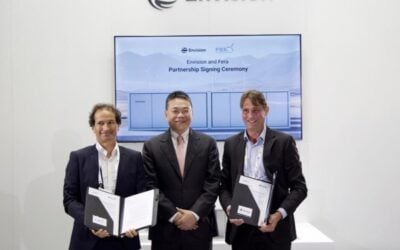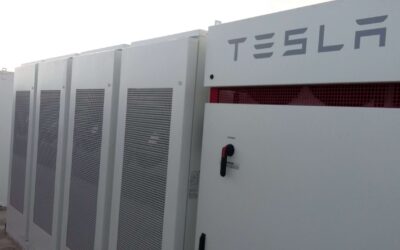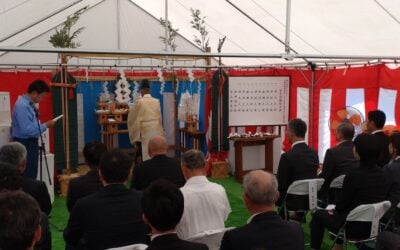Germany’s scheme pays around €600 per kilowatt of new PV installations, or slightly more for retrofits. Image: ASD Sonnenspeicher/Weberhaus.
A trade association representing some of Germany’s energy storage industry has welcomed the renewal of a support scheme for batteries, but says that establishing “fair market conditions” for storage would be more important.
At present, Germany’s federal government offers around €600 per kilowatt (US$634) of new PV installations, or slightly more for retrofits, coordinated by the ministry of economics and technology (BMWi), applicable to lithium-ion battery-based energy storage systems.
Enjoy 12 months of exclusive analysis
- Regular insight and analysis of the industry’s biggest developments
- In-depth interviews with the industry’s leading figures
- Annual digital subscription to the PV Tech Power journal
- Discounts on Solar Media’s portfolio of events, in-person and virtual
The scheme had been due to expire at the end of 2015, but last week it appeared there was a reprieve, with Green Party politician Julia Verlinden revealing that energy and economy minister Sigmar Gabriel had confirmed there would be a U-turn and that the policy would stay in place next year. There is an expectation however that the rules governing it could be adjusted and details of what is likely to change and what will remain the same have not yet been decided or made public.
Speaking with PV Tech Storage this morning, Miriam Hegner of the German energy storage association, BVES, said it was good news that the subsidy would be extended – perhaps not so much from a financial perspective as from the perspective that politicians were starting to publicly recognise the extended role in the network and in the economy that energy storage could play.
“For us, its’ the right signal on the part of the politics to say they will continue with this programme,” Hegner said.
“…But we don’t focus on incentives. We say that energy storage is really ready for the market and it’s also ready for the market regarding competitiveness. So what we wold like to focus on is more to have a fair market entrance for energy storage.”
It has been said by commentators in numerous markets besides Germany, including the US and UK, that they would rather see the services and value energy storage can offer being recognised in competitive market conditions than to be paid for with public money. Among the most common problems is that the definition of how storage, as a relatively new resource from a network point of view, sits on the grid.
‘Right market conditions will make incentives unnecessary’
Last year, in an interview with PV Tech Power, Solar Media’s downstream solar industry journal, Chris Edgette of the California Energy Storage Alliance explained that regulatory definitions that pre-date storage cannot really be applied comfortably to modern scenarios.
“Storage can be at various times generation, load and it can help transmission and distribution. And those areas of the grid are very ‘siloed’ in the US system. In some cases there’s a firm regulatory wall. So when you have a resource that can help with all four of those things, you end up with policy and regulatory challenges,” Edgette said.
Miriam Hegner, who deals with technologies and standards issues for BVES, said it was a similar situation in Germany today.
“We are happy that politicians say ‘we want storage and we support storage’ [by extending this scheme] but overall we see that it’s important that we get in the energy law a fair definition and a fair treatment of energy storage plans, so they are not prosumers, they are not consumers, they are storage. We would like to have them handled as storage and not to make them pay consumer fees and conditions but to say they have their own place,” Hegner said.
“We would like to see the right market conditions and then incentives will not be necessary further on.”
Hegner said BVES welcomed the launch of new business models such as renewable energy utility Lichtblick’s ‘Swarm’ which aggregates small-scale storage into a larger grid resource, Sonnenbatterie’s sonnenCommunity, launched last week, the ‘Energy Neighbour’, a project in Bavaria which uses storage to reduce transmission line losses of power and increase network efficiency and ‘Strombank’, a community energy trading trial run by a university. These proved that it was possible to “make storage work economically,” Hegner said, but clearer definition and fair market conditions would enable more progress, she added.
Belectric’s Energy Buffer Unit at Alt Daber solar farm pre-qualified for the grid-balancing market earlier this year. Image: Belectric.
‘Rules for frequency regulation need clarification’
For larger-scale storage, BVES felt the conditions to pre-qualify storage devices to participate in grid-balancing frequency regulation markets in Germany also needed clarification. Utility-scale batteries can be far quicker and more efficient in responding to signals to ramp up or power down than combined cycle gas turbines, which are traditionally used for the vital role.
Hegner said many of the rules are currently ambiguous. The most pressing concern was that a condition could be introduced which would require systems delivering frequency response – known in Germany as primary control reserve – to prove they could make power available to the grid for two 30-minute periods. At present the requirement is to make the power available for 15 minutes.
For technologies such as li-ion batteries, which are suited to pushing out high power for short duration, this could make the market prohibitively expensive, Hegner said. Furthermore, the long time it took to pre-qualify devices was causing a bottleneck of projects that developers were trying to get off the ground, she claimed.
Earlier this year Belectric celebrated the pre-qualification of one of its projects for that market. Hegner said this made it one of the lucky ones and hoped there would be more to come.
“We hope so. It was really difficult in the market because these rules weren’t so clear. Many projects were just waiting and waiting and waiting and didn’t get this pre-qualification, and we hope that now when we have clearer rules that it will be much faster to get new projects in the market.”






